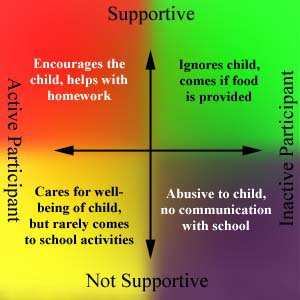- OU Homepage
- Search OU
- OU Social Media
- The University of Oklahoma
Four Types of Parents
This KnowledgeBase archive includes content and external links that were accurate and relevant as of September 30, 2019.
All schools have parents who display a broad spectrum of involvement: parents who are committed to their children but do not participate, those who participate but are not necessarily supportive, and parents who neither support nor participate in their child's education. In rethinking parent involvement, schools might better evaluate the degree of involvement by separating the notions of support and participation (see the chart below for four basic "types" of parents).
- As the chart depicts, at one end of the spectrum are parents who are both supportive and willing to participate (yellow). They are likely to attend workshops and conferences, respond to notes and telephone calls, and get involved in decision-making roles through advisory committees and planning teams. However, this is not a comfortable role for many parents, nor should it necessarily be considered the ultimate goal of parent involvement.
- Some parents simply are not "joiners", even though they may care deeply about their child's education (green). For them, several kinds of approaches hold promise. Newsletters with suggestions for home activities have proven to be successful, as have school-based activities where there is "safety in numbers" (for example, "make-and-take" workshops) and meeting parents on their own turf through home visits.
- Perhaps a rarer parent “and the most difficult type to identify“ is the one who pays lip service to education by attending events, but is not supportive at home (red). This type of parent, for example, may attend a parent-teacher conference only to go home and ignore or mistreat the child.
- Parents who are unsupportive and do not participate (purple) are obviously the most difficult to reach, but perhaps the most important group on which to focus efforts to improve communication. First, it is essential to determine the basis for their lack of involvement. In many cases, the reasons stem from the fact that the parent's own problems take precedence over his or her child's education. If the situation involves an abusive environment, the only kind of solution possible may be to refer the parent to an outside agency. Parent liaisons or parent advocates who provide one-on-one assistance have successfully addressed the needs of these parents.
As expected, lack of parent participation is a prevalent problem among America's schools today. But more disturbing is the number of parents who are perceived as unsupportive and the effect this has on their children. These parents may be at risk themselves. They could be drug addicts, alcoholics, child abusers, or they may simply have bad memories of their own school experiences and denigrate the value of education.
Gaining parent support “for their children and for education“ is a prerequisite for improving parent involvement. The best way to elicit the support of parents is by improving communication. Studies have shown that initial efforts to build support through improved communication with parents ultimately results in more involvement. However, one can't always measure this improvement by attendance at workshops or parenting classes.
Source:
This information is excerpted from Parental Involvement, what does it really mean? developed with funds from the former Region VII Comprehensive Center at the University of Oklahoma.

The contents of this website were developed under a grant from the U.S. Department of Education and are intended for general reference purposes only. However, those contents do not necessarily represent the policy of the U.S. Department of Education or the Center, and you should not assume endorsement by the Federal Government. Some resources on this site require Adobe Acrobat Reader. This website archive includes content and external links that were accurate and relevant as of September 30, 2019.
